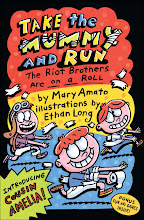If you were a "good student" in school, you may sometimes find your creating writing strangled by the long-ingrained impulse to write correctly. Sometimes I forget to allow my characters to stumble, to speak in fragments, to say what comes out. Speech, thankfully, is not robotic and grammatically perfect; it’s sometimes rushed, sometimes painful, often quirky or unconventional. Author M.T. Anderson is a master of capturing authentic voice. Am I legally allowed to pull a quote from one of his books and post it as an example? I don’t know. Every time I read him, I'm reminded how much I need to let go.
Tuesday, June 23, 2009
Sunday, June 14, 2009
Writing Tip #13: The Essential Wiring

Identify your climax (the ultimate showdown between your protagonist and antagonist). Think of it as the moment when all the lights and sounds go off. Basically, you want all the wires to be connected in such a way as to enable the climax to work. You don’t want any broken circuits. You also don’t want lots of unnecessary wires tangling up the scene. Follow each element of your story back from the climax to the beginning as if you’re tracing the wires. Take a good hard look at anything that doesn’t connect to your climax. Either get rid of it or re-engineer it so that it adds more power.
Subscribe to:
Comments (Atom)

